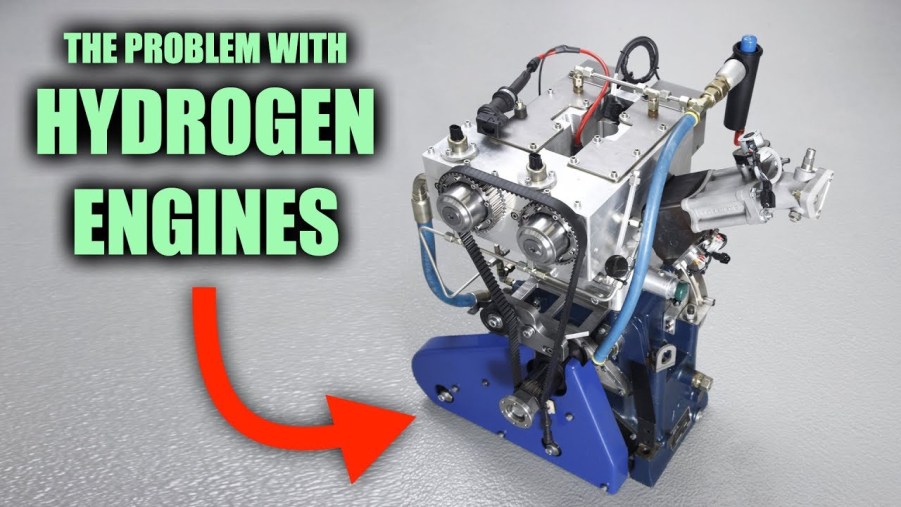
Here’s Why a Hydrogen Combustion Engine Will Never Be Popular
Hydrogen combustion motors aren’t a new idea. Back in the early 1800s, hydrogen was the fuel of choice because gasoline was too unstable to use. Everything changed when engineers added carburetors to the petroleum engines, a raw form of the fuel injection we’re familiar with today. Gasoline became safer to use since they could now achieve proper air-to-fuel ratios for combustion.
Fast forward over a hundred years, and the gasoline-powered motors are phasing out for more preferred methods of fueling our vehicles. Hydrogen is coming back into the limelight, but many people question its true effectiveness.
Why the interest in using hydrogen combustion engines?
Engines running on octane fuel have dominated sales for many years. Now that we’re in the age where running low on fossil fuels is a real threat, vehicle needs are changing. People want an alternative that not only saves our natural resources but reduces the carbon emissions that gasoline releases into the air, damaging the environment. Interest in other fuels, like hydrogen, are climbing because more people want to reduce the negative effects gasoline has on the earth.
Hydrogen is one alternative that has caught some people’s attention because of the advantages of having this kind of internal combustible engine running our vehicles. Some benefits hydrogen offers are:
- Water emissions (instead of the carbon seen with gasoline)
- Hydrogen Air/fuel mixture is easier to ignite
- Can run on lean mixtures and still combust quickly
- Because of high diffusivity (hydrogen spreads and mixes with air quicker than gasoline), it reduces dangers associated with possible leaks
It looks to be a great method of fuel technology since even NASA refers to it as the number one choice for fueling their rockets. They feel it’s perfect for space travel because of the low molecular weight and its ability to burn with intensity.
Hydrogen Problems
On the surface, a hydrogen combustion engine seems like a perfect solution for eliminating the negative effects of gasoline-powered vehicles. However, as Jason Fenske from Engineering Explained says, there’s more to it than the data we see on paper. He tells us that there are more drawbacks to the hydrogen combustion engine that we may not realize, making it an unlikely contender as an alternative to gasoline combustible motors.
First, hydrogen and air mixtures produce water emissions, but because of the high heat generated within the combustion chamber, nitrogen oxide still forms as a by-product. This compound not only harms the environment but also causes many medical problems, both short and long-term.
Second, hydrogen combustion engines have a low energy density by volume. This means it has almost half the efficiency that other alternatives have, to propel a vehicle. To match other fuel mixtures, it would require a much larger tank, which would consume more cargo and passenger space of the car. Plus, to fill that tank, it would cost quite a bit more, because hydrogen, per gallon, is double the cost of the same amount of gasoline.
Since NASA’s rockets require huge tanks to store the fuel, this technology would work perfectly. But, with smaller engines in cars and trucks, it wouldn’t provide fuel as efficiently as we would need it.
Are there alternatives to the internal combustion engine?
A hydrogen combustible motor may not catch on as other fuel alternatives refine their technologies. But, that doesn’t mean that there aren’t other options that can help save the environment and be more economical to run.
As we’ve seen over the last couple of decades, electric vehicles are on the rise. However, they haven’t quite caught on as there are still bugs that are being worked out. Hybrid cars are creating a niche in the car market with combinations of battery-powered and gas-powered motors.
Market Watch forecasts that hydrogen-powered vehicles could dominate in the years to come, just in a different type of engine. Manufacturers, like Honda, Hyundai, Volvo, and others have sold and developed newer cars that use fuel cell technology. One that refines the hydrogen method and combines it with other processes to make it a viable alternative to gasoline combustion engines. So, it looks like hydrogen may still be a part of our future.


